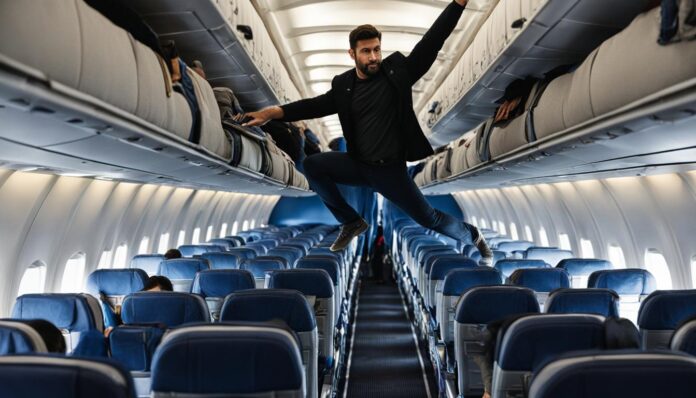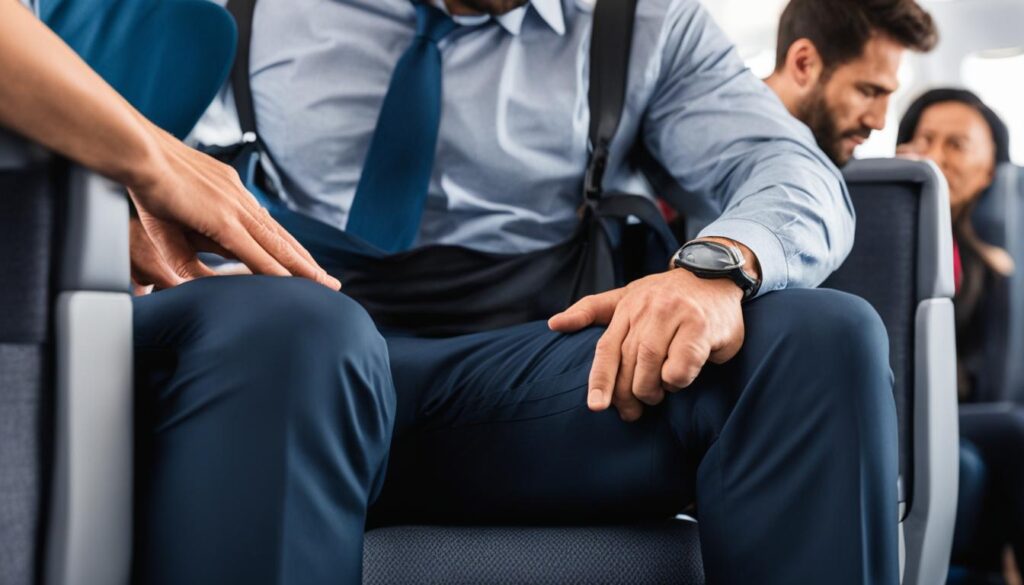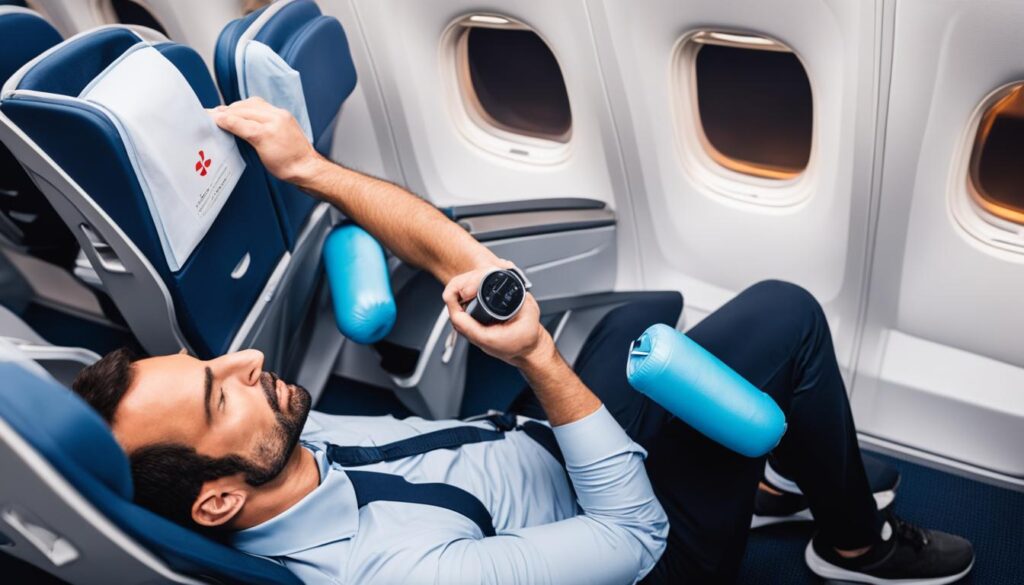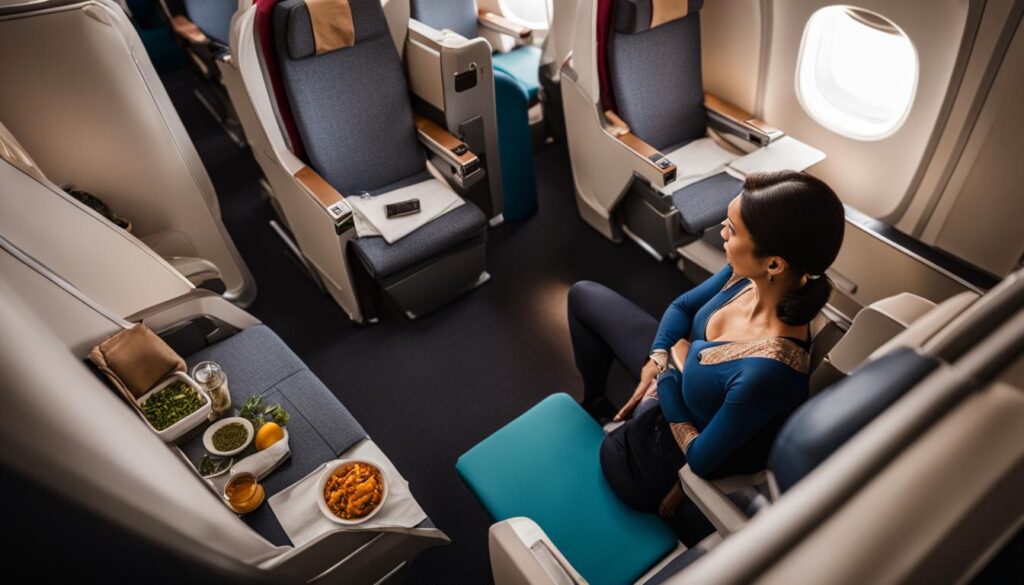Traveling long distances can be exciting and adventurous, but it also comes with its challenges, especially when it comes to staying healthy during the journey. Whether you’re a seasoned traveler or have a fear of flying, this guide will equip you with the top tips on how to stay healthy on a long flight. By following these recommended strategies, you’ll prevent health issues on long flights and feel energized when you arrive at your destination.
From packing nutritious snacks and staying hydrated to incorporating movement and exercise into your routine, this guide contains essential health tips for long flights. You’ll also discover how to create a comfortable and healthy cabin environment and find ways to manage jet lag. Let’s dive into the best tips and strategies for staying healthy during long flights.
Prepare for Your Journey
Long flights can take a toll on your body, so it’s important to prepare yourself physically and mentally before takeoff. Here are some essential health tips for long flights that can help you arrive at your destination feeling your best:
Get Enough Rest
Make it a priority to get plenty of rest in the days leading up to your flight. This will help you feel well-rested and energized for the journey ahead.
Stay Hydrated
Drink plenty of water before your flight to ensure your body is hydrated and to prevent dehydration on board. Consider bringing an empty water bottle with you so you can fill it up once you’re through security.
Pack Healthy Snacks
Bringing your own nutritious snacks can help you avoid the temptation of unhealthy airport food. Consider packing fresh fruit, nuts, or granola bars to keep you fueled throughout the flight.
Dress Comfortably
Wear comfortable clothes and shoes to help prevent discomfort during the flight. Consider bringing layers, as cabin temperatures can vary.
Mentally Prepare
Long flights can be mentally taxing. Prepare yourself by bringing a good book, downloading a movie or TV show, or bringing a puzzle or game to keep your mind engaged and occupied.
Hydration and Nutrition
Proper hydration and nutrition are essential to staying healthy during a long flight. When flying, the air is dry, and the enclosed space can cause dehydration and fatigue. It is important to drink plenty of water and other fluids to stay hydrated.
Bring a reusable water bottle with you on the flight and fill it up regularly, or ask the flight attendants for water, herbal tea, or other non-alcoholic beverages. Avoid drinking too much coffee, tea, or soda, as they can dehydrate you even more.
When it comes to nutrition, packing your own snacks can ensure that you have healthy options on hand. Opt for whole foods like fresh fruit, raw veggies, nuts, and hummus. Avoid processed snacks, which can be high in salt, sugar, and unhealthy fats.
If you have special dietary requirements, contact your airline in advance to request a special meal. Many airlines offer vegan, vegetarian, gluten-free, or other options to accommodate different dietary needs.
Tip: Pack some dried fruit, like apricots, cranberries, and raisins, for a healthy alternative to sugary snacks.
Movement and Exercise
Sitting for extended periods is tough on your body, and it’s important to incorporate movement and exercise during your flight to keep your blood flowing. These exercises and stretches can be done in the comfort of your seat:
- Neck stretch: Tilt your head to the left and hold for 10 seconds, then repeat on the right side. Repeat 3 times.
- Shoulder roll: Shrug your shoulders up towards your ears, then roll them back and down. Repeat 6 times.
- Ankle circles: Lift one foot off the floor and make circles with your toes. Repeat 10 times in each direction, then switch feet.
- Leg lift: Lift one leg up and hold for 10 seconds, then lower and repeat on the other leg. Repeat 3 times on each leg.
You can also take short walks up and down the aisle to get your body moving. Just be sure to check with the flight attendants before doing so, as it may not be safe during turbulence.
Sleep and Rest
Getting enough rest during a long flight is crucial for your overall well-being. Here are some strategies to optimize your sleep space:
- Choose a window seat to minimize disruptions from other passengers.
- Use earplugs or noise-cancelling headphones to block out noise.
- Wear an eye mask to help you sleep in bright conditions.
- Bring a neck pillow or a small travel pillow to keep your head and neck comfortable.
You can also try relaxation techniques to help you get the rest you need. Breathing exercises, meditation, and listening to calming music can all help you relax and fall asleep more easily. Avoid using electronic devices before bed, as the blue light can interfere with your sleep.
“A good laugh and a long sleep are the two best cures for anything.” – Irish proverb
Cabin Environment
The environment inside the cabin can significantly affect your health during a long flight. It is essential to take necessary precautions to stay healthy.
The air quality inside the cabin can contribute to fatigue, headaches, and respiratory problems. To avoid such issues, try to sit in the front part of the aircraft because it is where air circulation is optimal. If you have allergies or breathing problems, use a mask or nasal spray. Moreover, when traveling during a pandemic, take appropriate measures, such as wearing a mask at all times and following hygiene protocols.
Reducing exposure to germs is also crucial to maintaining good health, especially when inside an enclosed space for a prolonged period. Avoid touching anything that might harbor germs, such as seat pocket or the overhead compartment. Use disinfectant wipes to clean your tray table, armrests, and seat belt.
Avoiding Dehydration
Staying hydrated is vital to prevent health issues on long flights. Dehydration can cause fatigue, headaches, and other problems, so ensure that you drink enough water. It is recommended that you drink at least 8 ounces (237 ml) of water every hour during the flight. You can also bring an empty water bottle through security to fill up at the airport before boarding.
Optimizing Your Space
Optimizing your space can make a significant difference in your comfort level during the flight. You can achieve this by adjusting the air vent to the right temperature, using earplugs to block out noise, and wearing comfortable clothes that are not too tight. Additionally, you can bring items like neck pillows, blankets, and eye masks to improve your sleep quality during the flight.
| Tip | Description |
|---|---|
| Use a humidifier | Bringing a small portable humidifier that fits under the seat can help alleviate dryness in the cabin air and prevent dehydration. |
| Choose a window seat | Choosing a window seat can provide you with easy access to the aisle and control over the window shades, allowing you to regulate natural light and your sleep cycle. |
| Wear compression socks | Compression socks can improve blood circulation and prevent swelling in your feet and legs. |
By following these tips for maintaining good health on long flights, you can minimize the negative effects of extended travel and arrive at your destination feeling refreshed and well.
Managing Jet Lag
One of the biggest challenges of long-haul flights is adjusting to different time zones, leading to jet lag. The symptoms can range from mild fatigue to more severe issues, such as headaches and stomach problems. However, there are strategies you can use to manage jet lag and prevent it from impacting your health and well-being.
Adjust your sleep schedule before your flight
If you know the time zone of your destination, then adjusting your sleep schedule a few days before your flight can help your body adapt more quickly. Gradually move your bedtime closer to the new time zone, at least a few days before your trip. This will help your body adjust to the new time zone much faster, decreasing the effects of jet lag.
| Before the Flight | During the Flight | After the Flight |
|---|---|---|
|
|
|
Choose your arrival time wisely
If possible, plan your arrival time to coincide with daylight hours at your destination. This will help regulate your body’s circadian rhythm and allow you to adapt to the new time zone more quickly.
Stay hydrated and avoid alcohol and caffeine
Drinking plenty of water and avoiding alcohol and caffeine can help you feel better and reduce the symptoms of jet lag. Alcohol and caffeine can both dehydrate you, leading to fatigue and headaches. Instead, drink water or herbal tea during the flight to help you stay hydrated and refreshed.
By incorporating these strategies into your travel routine, you can manage jet lag more effectively and enjoy a healthier and more comfortable journey.
Mind and Body Wellness
During a long flight, it’s essential to take care of your mental and emotional well-being, just as much as your physical health. Travel can be stressful, so focusing on mindfulness and staying engaged can make all the difference in how you feel upon arrival.
One effective way to stay mentally engaged during a long flight is to read a book, listen to music, or watch an entertaining movie. Keeping your mind occupied can help reduce stress and pass the time more quickly.
Another way to prioritize your mental health is to practice mindfulness techniques. You can use breathing exercises or meditation to quiet your mind and promote relaxation. If you’re feeling anxious during the flight, take a few deep breaths and focus on the present moment.
It’s also crucial to get up and walk around the cabin during the flight. This can help improve circulation and reduce the risk of blood clots. When you’re walking around, try to stretch your arms, legs, and back to alleviate stiffness.
“Taking care of your mental and emotional well-being is just as important as your physical health during a long flight.”
To keep your body relaxed and comfortable, bring a neck pillow, an eye mask, and noise-cancelling headphones. These items can help you get a more restful sleep during the flight, which can make all the difference when you arrive at your destination.
Remember, staying healthy during long flights is all about balance. Focus on keeping your body and mind engaged while prioritizing rest and relaxation. By combining these techniques, you’ll arrive at your destination feeling refreshed and ready for your next adventure.
Immune Support
Staying healthy on long flights involves bolstering your immune system to prevent health issues. Being exposed to germs in the confined space of an airplane puts you at risk of illnesses like colds and the flu. Here are some tips for maintaining good health on long flights:
- Wash your hands frequently – Use soap and water or an alcohol-based hand sanitizer to keep your hands clean, and avoid touching your face.
- Stay hydrated – Drinking plenty of water helps flush out toxins and keep your immune system functioning properly.
- Take immune-boosting supplements – Vitamin C, echinacea, and zinc are all natural supplements that can help support your immune system. Consult your doctor before taking any new supplements.
- Avoid alcohol and caffeine – These substances can dehydrate your body and weaken your immune system.
- Get plenty of rest – A well-rested body is better prepared to fight off illness.
- Use a saline nasal spray – Keeping your nasal passages moist can help prevent the spread of germs.
By following these immune-boosting strategies, you can reduce your risk of getting sick and maintain good health during your long flight.
Conclusion
Long flights can be taxing on your body and mind, but by following these tips, you can make sure you arrive at your destination feeling your best. Remember to prepare yourself mentally and physically for the journey ahead, stay hydrated and well-fed, incorporate movement and exercise into your flight routine, optimize your sleep space, and take care of your mental and emotional well-being. Additionally, make sure you’re taking care of your immune system to protect yourself from common illnesses that circulate on airplanes.
With these strategies in mind, you can minimize the negative effects of extended travel and have a healthier and more enjoyable flight experience. Safe travels!

















































